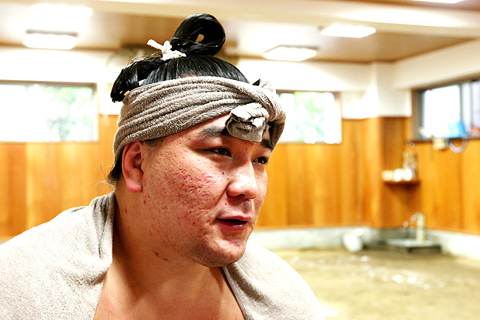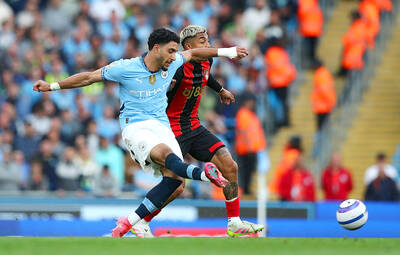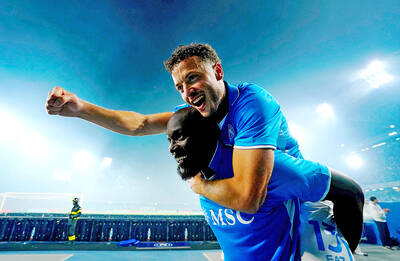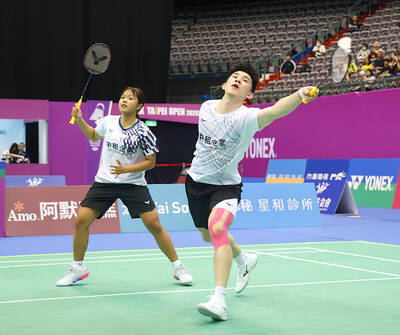The Japanese word kawaigari means “doting,” but in the grueling world of sumo it is an ironic euphemism for pushing a wrestler to the very limits of his physical and mental endurance.
It can include beatings with bamboo sticks and choking with sand or salt — and in one infamous case led to the death of a teenage recruit who had tried to flee the privations of his sumo stable.
Harumafuji, who last month won Japan’s major tournament, recalled the pain and tears that toughened him up in the nine years since he arrived from his native Mongolia with no money and not a word of Japanese.

PHOTO: AFP
“It’s a man’s world,” said the 25-year-old champion whose real name is Davaanyam Byambadorj, taking a rest with a sweatband around his head after a recent five-hour morning training session in his Tokyo stable.
“I had to get used to the bullying, beatings, hunger, and then the language and the culture which I did not understand,” he said, recalling how he was singled out for extra torment because he is a foreigner.
“It was rough,” he said. “It’s a world where you either become strong or not. In that sense, as much as it was painful, I felt very strongly that I would do my best to become strong as quickly as possible.”
In sumo, kawaigari means “crying, then being forced to stand, then being beaten again. It’s not simple to express with words because it’s a physical experience,” he said.
But it’s not just the beatings that steel the wrestlers in the quasi-monastic life of the sumo stable, where the fighters forfeit much of their personal liberty and embark on a grueling daily routine.
The younger wrestlers start the day at 3am cleaning the stable, washing their seniors’ loincloths and preparing meals. They are banned from watching television and using cellphones, and receive only modest pocket money.
Harumafuji said he found it toughest to get used to a diet heavy on fish — which has sent some of his mutton-eating compatriots running to the Mongolian embassy to escape Japan — served in huge quantities of 10,000 calories a day.
“Everyone says going on a diet is hard, but I think gaining weight is so many times more difficult,” he said. “Eating was the scariest, and my most painful experience.”
“I’m thin by nature, so I really had a hard time to eat in the beginning. I ate and I vomited. Ate and vomited. Your stomach expands when you do that, so I was forced to eat until I vomited,” Harumafuji said. “When I vomited, there would be someone already waiting with food, and I was forced to eat again.”
The force-feeding helped boost the 1.85m athlete’s weight to 126kg from 86kg — still about 30kg lighter than the average top division wrestler.
Harumafuji has no regrets.
“The sumo ring is very honest. He who really does his best will rise. Man’s efforts don’t lie,” he said. “I’m glad I did sumo, I am very grateful. I have learnt many things inside the ring, about life, the path I’ve chosen, about cherishing people.”
“Any punk who swaggers into a stable will change in one day. He will be cleaning the next day — cleaning toilets, crying. He’d be forced to lick the toilet bowl, because he’d be bullied,” Harumafuji said, smirking. “There are many obstacles, but if you’re able to get over them, you can become stronger than the others. If you rise up, everyone will follow you, thinking, ‘This guy’s tough.’”
Sumo may be as Japanese as samurai and sushi, but foreign-born wrestlers have entered the ring to steal the show in the 2,000-year-old national sport.
Sumo hasn’t had a home-grown champion in more than three years, and in the latest national tournament more than one-third of competitors were foreigners.
As fewer young Japanese sign up for the harsh life of the sumo stable, the sport’s 700-strong elite now include men from China, South Korea, Eastern Europe and as far away as Brazil and the Pacific island state of Tonga.
As sports such as baseball and soccer have gained ground, the number of Japanese sumo recruits has more than halved since its peak in 1992 of 223 local wrestlers.
Traditionally, young wrestlers were recruited from farming and fishing communities in the remote north and south, said Doreen Simmons, a veteran English-language sumo commentator for national broadcaster NHK.
Sumo opened its doors to foreigners decades ago, and spectators still delight when gaijin wrestlers exhibit what are seen by many as the essential Japanese characteristics of modesty, endurance and diligence.
The presence of foreigners will not lead to the internationalization of the sport, Simmons said, as the newcomers must assimilate, learn Japanese and adapt to the local diet, dress, customs and training regime.
“Any foreigner who succeeds in sumo must do it the Japanese way,” she said.

Omar Marmoush’s stunning long-range strike on Tuesday upstaged Kevin de Bruyne on the Manchester City great’s Etihad farewell. Marmoush let fly from about 30m to put City ahead in their 3-1 win against AFC Bournemouth in the Premier League. The victory moved Pep Guardiola’s team up to third in the standings and left qualification for the UEFA Champions League in their own hands heading into the last round of the season. “It’s really important. To be in the Champions League after what happened [this season] will be really nice,” the City manager said. De Bruyne was making his final home appearance for City before

TIGHT FINISH: Napoli only needed to do the same as or better than Inter, who won their game against Como 2-0 on the same day, leaving Napoli with a one-point lead The two players who Antonio Conte wanted more than any others secured Napoli their second Serie A title in three years on Friday. Scott McTominay scored with an acrobatic bicycle kick before halftime and Romelu Lukaku doubled the lead with a solo goal after the break in the decisive 2-0 home win over Cagliari. Conte became the first coach to win the Italian championship with three different teams. “Everyone contributed to this — but the coach most of all,” Napoli captain Giovanni Di Lorenzo said. “Napoli needed him to get back on top. He’s phenomenal.” Comparing it to his three Serie A titles won

The journey of Taiwan’s badminton mixed doubles duo Ye Hong-wei and Nicole Chan at the Malaysia Masters in Kuala Lumpur came to an end in the semi-finals yesterday after they suffered a 2-0 loss to China’s Feng Yanzhe and Huang Dongping. Ye, 25, and Chan, 20, teamed up last year and are currently ranked No. 23 in the world. The Taiwanese shuttlers took on China’s second seeds in the mixed doubles event, but proved no match for Feng and Huang, losing the match 10-21, 7-21. In the first half of the first game, the pairings were neck and neck at 6-7 until Ye

SSC Napoli coach Antonio Conte has dragged the team back from disaster and restored them to the top of Italian Serie A, but his future at the Scudetto winners is in doubt even after a triumphant season. The fiery 55-year-old has exceeded preseason expectations and bolstered his reputation as a serial winner by guiding Napoli to their fourth Scudetto, and second in three seasons. However, he might well be on his way in the summer after just one season at the helm as his charged relationship with Napoli owner Aurelio De Laurentiis has simmered throughout the campaign. Conte has said